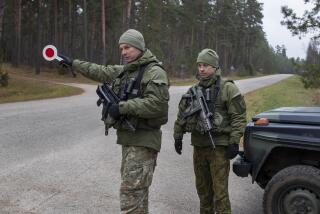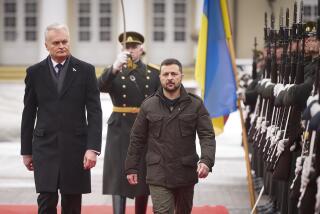Yeltsin Meets Lithuanian on Easing Blockade
- Share via
MOSCOW — Boris N. Yeltsin, vividly showing how he intends to press his policies on Mikhail S. Gorbachev as the Russian republic’s new president, met with Lithuania’s top leader Friday to discuss future cooperation to breach the Kremlin’s partial economic blockade of the Baltic state.
Yeltsin’s one-hour meeting with Lithuanian President Vytautas Landsbergis was the plainest sign since his election three days earlier that not only does the Communist radical feel unbound by decisions of the Soviet leadership in his new office, he also plans to use it to torpedo them.
Landsbergis has been persona non grata in the Kremlin since he led the Lithuanian Parliament in its unilateral declaration of independence March 11, and it was hardly accidental that Yeltsin decided to receive him in his first days as leader of the largest, richest and most populous of the Soviet republics.
The maverick populist also told reporters that he wants to see Gorbachev when he returns from his Washington summit with President Bush and that he is ready to compromise. But his meeting with Landsbergis was a clear sign that where Gorbachev previously had an ornery firebrand on the left to contend with, he now must face a vastly popular political leader ready to challenge him with the powers of his new office, which he won over Gorbachev’s opposition.
Gorbachev has repeatedly told the Lithuanians that their act of independence must be suspended or “frozen” to bring about negotiations and the end of hobbling Soviet economic sanctions now in their seventh week. But the Yeltsin-Landsbergis talks spoke of how to revive direct trade between Russia and the Ireland-sized Baltic land, participants said.
Nikolai Medvedev, a member of Lithuania’s Parliament who attended, said the two presidents focused on how to re-establish trade between their republics, as well as on future interaction of their parliaments to circumvent the Moscow-based Soviet bureaucracy.
“The existing blockade or economic sanctions against Lithuania is a crying absurdity which cannot but damage Russia as well,” Medvedev said in a telephone interview. “Under the present situation, trade relations are the best way to maintain direct contacts between the republics.”
In a statement, Lithuania’s government said Yeltsin and Landsbergis “discussed possibilities for future cooperation” between their republics, but gave no details. ELTA, the Lithuanian news agency, quoted Landsbergis as saying the meeting is the start of “future promising contacts with the Russian Federation.”
If the vastly wealthy Russian Federation were able to supply Lithuania with the crude oil and natural gas now cut on Gorbachev’s orders, it would mean that Kremlin economic sanctions against the republic of 3.8 million people would be virtually doomed.
Yeltsin has said that within 100 days, the Russian Parliament should declare the Russian Federation “sovereign.” What that means--and what Gorbachev’s central Soviet government might allow it to mean--still must be defined, but Yeltsin wants Russia’s officials to be masters of the republic’s enormous resources, as well as for Russia to have the power to disregard national laws it dislikes.
Yeltsin, 59, a former protege of Gorbachev until their falling-out over the pace of reform in November 1987, said Friday that he hadn’t met with the Soviet president for a year and that it was necessary for them to talk when Gorbachev returns to Moscow from the United States.
“I am prepared to go a good part of the distance toward Gorbachev, throwing aside everything personal that has piled up recently. I hope that he, too, will cover part of that road,” the official Soviet news agency Tass quoted Yeltsin as saying during a break in the Russian Parliament’s proceedings. “We have got to meet with him (Gorbachev) and discuss important questions.”
Lithuania is struggling under the economic sanctions imposed April 18 by Gorbachev, and according to a spokesmen for the breakaway government, the punitive measures have already cost the largely agricultural republic the equivalent of more than $100 million.
According to official Radio Vilnius, more than 40,000 workers have had to be laid off and eight factories shut down. Communally supplied hot water has been cut off to apartments because there is not enough fossil fuel to heat it, and Tass said Friday that the sole power plant still operating in Lithuania, the Ignalina nuclear power station, will have to shut down soon.
“The situation in Lithuania is now critical,” Liaonas Asmontas, the energy minister, told the lawmakers in Vilnius.
There will be some relief from abroad, but at a cost. Lithuanian Radio reported that Poland has agreed to begin shipping cooking oil and sugar to the republic, but at prices above what it paid Soviet suppliers.
The two other Baltic republics, Estonia and Latvia, have also set a course toward independence, but chose more gradual paths than Lithuania’s unilateral declaration. All three homelands on the Baltic coast became independent countries following the 1917 Bolshevik Revolution but were forcibly annexed by dictator Josef Stalin in 1940 under a secret pact with Nazi Germany and transformed into Soviet republics.
The Balts say no one asked them whether they wanted to be a part of the Soviet Union so they can leave any time they want. Gorbachev, however, insists that all three follow tough secession procedures laid down by a law passed this spring, claiming any other course is a violation of the Soviet constitution.
Gorbachev has not lowered the boom economically on Estonia or Latvia, but Latvia’s May 4 declaration of its intention to restore independence sparked panic buying by residents expecting Gorbachev to act. On Friday, Latvia began rationing of some food supplies to ensure the whole population has a steady supply.
Events this week showed that as Yeltsin maps out his strategy and role as chairman of the Russian Supreme Soviet (legislature), or president of the republic, he will have to face centrifugal pressures like those he is applying on Gorbachev as demands for “sovereignty” also seep down to the municipal level.
The Moscow city government, now in the hands of radicals and reformers, exercised its new-found independence this week by shutting the capital’s stores for the next two weeks to non-Muscovites. Enraged by that action, surrounding towns for which Moscow was a source of salami, TV sets and other hard-to-find goods have begun to fight back.
Starting Friday, the city of Kaluga decided to pare its meat deliveries to Moscow by 600 tons and its milk shipments by 3,500 tons, and began rationing the sale of flour, meat and other foods, meaning that Muscovites who have their dachas, or weekend country homes, in the vicinity had better brown-bag it.
To the east of the capital, the ancient Russian city of Vladimir ordered an end to sales of locally distilled vodka to Moscow. From Yaroslavl to Kursk, angry city leaders ordered cuts or halts in food shipments to Moscow or restricted their sale to people who, as in the capital, can prove they are residents.
“Limitations imposed by Moscow threaten to backfire as nearby regions consider retaliation,” Tass said. “This has prompted (Moscow) authorities to lift all restrictions on sales on Sundays.”
Meanwhile, prices in the capital’s peasant markets, customarily crammed with out-of-town farm workers hawking their produce, have also shot up.
More to Read
Sign up for Essential California
The most important California stories and recommendations in your inbox every morning.
You may occasionally receive promotional content from the Los Angeles Times.










